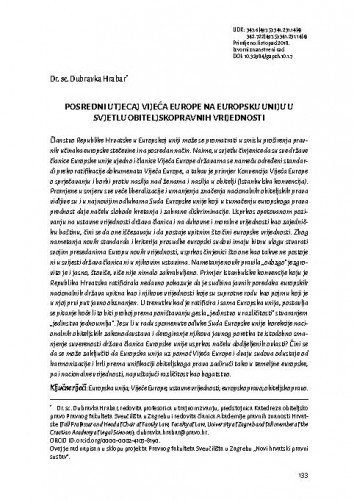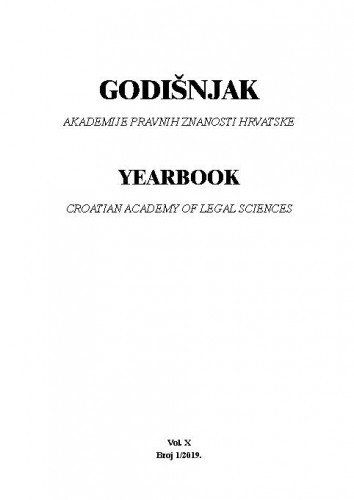Članstvo Republike Hrvatske u Europskoj uniji može se promatrati u smislu proširenja pravnih učinaka europske stečevine i na posredan način. Naime, u svjetlu činjenice da su sve države članice Europske unije ujedno i članice Vijeća Europe državama se nameću određeni standardi preko ratifikacije dokumenata Vijeća Europe, a takav je primjer Konvencija Vijeća Europe o sprječavanju i borbi protiv nasilja nad ženama i nasilja u obitelji (Istanbulska konvencija). Promjene u smjeru sve veće liberalizacije i umanjenja značenja nacionalnih obiteljskih prava vidljive su i u najnovijim odlukama Suda Europske unije koji u tumačenju europskoga prava prednost daje načelu slobode kretanja i zabrane diskriminacije. Usprkos opetovanom pozivanju na ustavne vrijednosti država članica i na duhovne i moralne vrijednosti kao zajedničku baštinu, čini se da one iščezavaju i da postaje upitnim što čini europske vrijednosti. Zbog nametanja novih standarda i kriterija prosudbe europski sudovi imaju bitnu ulogu stvarati svojim presedanima Europu novih vrijednosti, usprkos činjenici što one kao takve ne postoje ni u svijesti država članica ni u njihovim ustavima. Nametanje novih pravila „odozgo“ jezgrovito je i jasno, štoviše, više nije nimalo zakrabuljeno. Primjer Istanbulske konvencije koju je Republika Hrvatska ratificirala nedavno pokazuje da je sudbina javnih poredaka europskih nacionalnih država upitna kao i njihove vrijednosti koje su suprotne rodu kao pojmu koji je u njoj prvi put javno obznanjen. U trenutku kad je ratificira i sama Europska unija, postavlja se pitanje hoće li to biti proboj prema poništavanju gesla „jedinstvo u različitosti“ stvaranjem „jedinstva jednoumlja“. Jesu li u radu spomenute odluke Suda Europske unije korekcije nacionalnih obiteljskih zakonodavstava i derogiranje njihova javnog poretka te istodobno smanjenje suverenosti država članica Europske unije usprkos načelu dodijeljenih ovlasti?; The European Union and the Council of Europe are two organizations whose objectives often overlap although their missions were originally different: the European Union is primarily an economic formation, while the Council of Europe is a political organization. Both have their courts with an increasing volume of case law, which is not always mutually consistent. The fundamental acts of the European Union, although devoid of religion, point out special values bringing together member states, such as respect for human dignity, freedom, equality, the rule of law, and respect for human rights. According to its Statute, the Council of Europe points out that common heritage of member states and promotion of human rights and fundamental freedoms are goals which are necessary to preserve human society and civilization. In addition, it emphasizes its adherence to cultural and moral values which are the common heritage of its members. The relationship between the European Union and the Council of Europe is special, and although there has been no support for the ratification of the European Convention for the Protection of Human Rights and Fundamental Freedoms by the EU, the EU has signed the Istanbul Convention which has gaven rise to great expectations of liberal political parties and lobbies regarding its ratification in the near future. It is not clear what this will mean for EU member states which have not ratified the Convention and probably never will. This constitutes a departure from original European values promoted at the time of the establishment of these organizations, which is evident from the case law of the European Court of Human Rights and the most recent decisions of the Court of Justice of the EU where the Court gave its interpretation of the (same-sex) marriage and contacts of family members in the context of freedom of movement and gender change (within the framework of the prohibition of gender-based discrimination in marriage).
Sažetak

 Godišnjak Akademije pravnih znanosti Hrvatske : Yearbook Croatian Academy of Legal Sciences : 10,1(2019) / glavna urednica, editor-in-chief Irena Majstorović.
Godišnjak Akademije pravnih znanosti Hrvatske : Yearbook Croatian Academy of Legal Sciences : 10,1(2019) / glavna urednica, editor-in-chief Irena Majstorović.